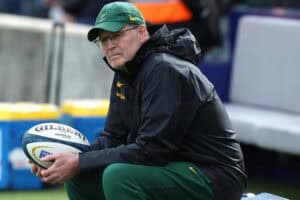Mandela knew this and leveraged it for the betterment of social cohesion. And then we allowed despair and capitalist greed to snatch that promise away from us.

When despair sets in, it is very easy to forget even the most basic things that unite us as South Africans.
One of the most iconic pictures from SA’s transition to democracy is that of Nelson Mandela wearing Francois Pienaar’s No 6 jersey and holding aloft the Webb Ellis Cup following the Springbok’s almost improbable victory over the All Blacks at Ellis Park in 1995.
It would be an exaggeration to say that every household in South Africa held its breath as Joel Stransky set up his drop goal to win that game. An exaggeration that captures the spirit that defined SA at that exact moment.
Sport had torn through racial barriers and gone to the heart of every South African, placing a seed of hope for a united future. Mandela knew this and leveraged it for the betterment of social cohesion.
And then we allowed despair and capitalist greed to snatch that promise away from us.
The most common refrain from the ahistorical youth and bitter, scared adults that Mandela tried to drag along into the new dispensation is that he sold us a dud. A utopia that fooled black people into thinking that the feel-good factor from sport defines the nation.
Far from it. In his own words: “Sport has the power to change the world. It has the power to inspire. It has the power to unite people in a way that little else does. It speaks to youth in a language they understand. Sport can create hope where once there was only despair. It is more powerful than government in breaking down racial barriers.”
When Siya Kolisi and the boys run onto the field against England in the World Cup final on Saturday in Japan, they’ll be in possession of South Africa’s key to unlocking hope and possibilities far beyond the game of rugby.
The sceptical, conservative Springbok supporter still carries in his heart the poisoned view of the prejudiced die-hard to whom Kolisi is part of the problem of those “that stole the game from us”. And this sceptic can’t wait for the Boks to lose and scream: “See, I told you so, transformation does not work!”
True patriots will know, though, that Rassie Erasmus’ boys might be claimed by the prejudiced as their own, but they represent the depth of possibilities that this country possesses.
The leadership of SA Rugby should be ashamed that in their pursuit of profits, they have colluded with pay television channels to deprive the majority of this country a chance to watch their heroes on free-to-air television.
Kolisi, the Bok captain, reportedly watched the Springboks’ 2007 triumph over England in the World Cup final at a tavern because his family did not possess a television set.
Twelve years, later he is leading the Springboks out against the same opponents in a World Cup final. A story that captures what South Africa is all about: possibilities, inequality, hope.
Mandela did not mean for the likes of Kolisi to represent the height of societal transformation, he meant them to represent the hope that the outward superficial racial differences can be overcome through sports.
But after breaking down the racial barriers, real work must be done to ensure that there is no other Kolisi who watches his heroes in a tavern because of being economically disadvantaged.

Sydney Majoko
For more news your way, download The Citizen’s app for iOS and Android.
Support Local Journalism
Add The Citizen as a Preferred Source on Google and follow us on Google News to see more of our trusted reporting in Google News and Top Stories.








